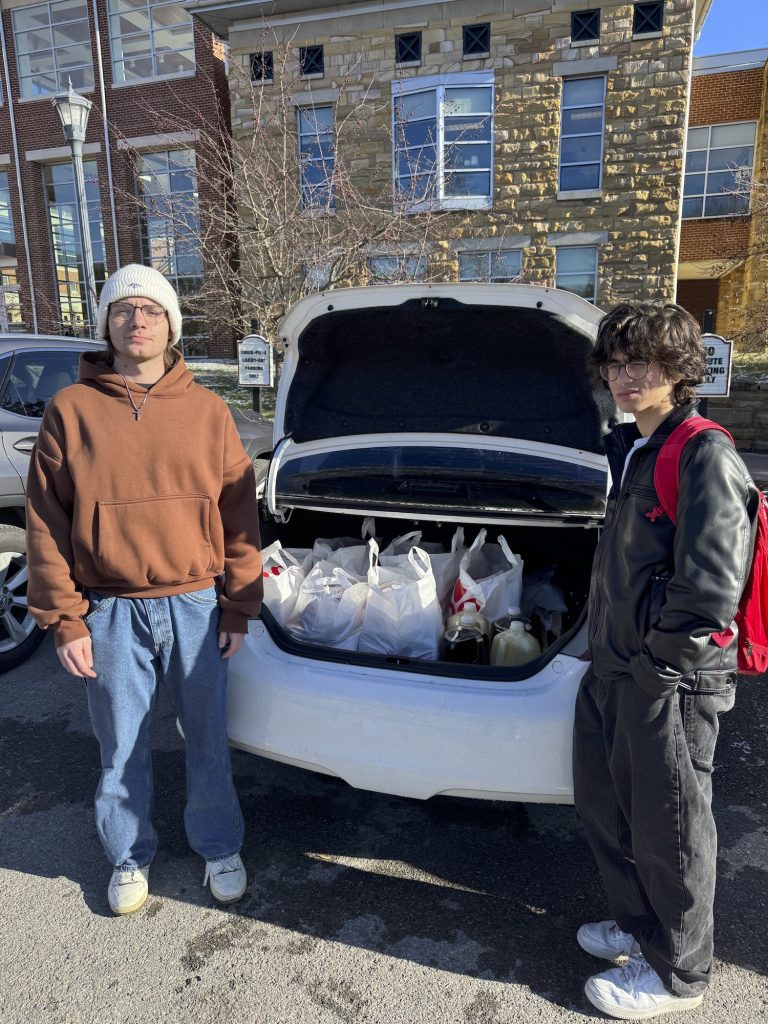Swipe to Support: How Two College Students Are Tackling Hunger in Appalachia

By Kayla Masterman
At the University of Virginia’s College at Wise, two first-year students — Inam Osmani, a mathematics and statistics major pursuing a minor in philosophy and economics, and Tufan Khalilov, a business major — share more than just a dorm room. They share a mission.
In October 2024, alongside a few friends, Osmani and Khalilov founded a grassroots organization, Swipe to Support, designed to redistribute their unused swipes to fight food insecurity in Appalachia.
It began with a simple observation. At the end of the semester, Osmani and Khalilov noticed dozens of unused swipes on their meal cards.
“Our goal from the very beginning was to solve food hunger — one swipe at a time,” Osmani says.
Khalilov explained that the idea of Swipe to Support grew to something a lot bigger than what he expected.
They created a system that lets students donate their unused meal swipes from on-campus dining.
Before collecting swipes, they coordinate with local crisis shelters to understand their needs.
Osmani explained that since most shelters serve around 50 people, they often partner with multiple shelters to distribute all of the donations.
“While we do focus on supporting the local community, we sometimes reach into neighboring states as Southwestern Virginia does not have enough crisis shelters to meet the scale of donations we aim to provide,” Osmanti says.
Their system is simple, but effective. Students with extra swipes meet at campus dining spots like Chick-fil-A, where meals are ordered fresh and packed for distribution.
“So people willingly give up their meal swipes and they say, ‘Hey, I have this many left and it’s all going to go to waste, so I’ll donate it,’” Osmani says.

From there, a team handles the outreach, contacting crisis shelters to find out how many meals are needed. The rest is loading up cars and hitting the road.
“We literally load up the car with everything we got and we just drive,” Khalilov says.
So far, they have reached six states: Kentucky, North Carolina, Pennsylvania, Tennessee, Virginia and West Virginia.
Osmani explained that for longer-distance donations, they primarily distribute nonperishable, canned foods to ensure they withstand transportation.
“Except for Pennsylvania, the states we serve — Kentucky, Tennessee, West Virginia, and North Carolina — all border Virginia, and deliveries typically take less than an hour or two, allowing us to include fresh foods as well,” Osmani says.
After Hurricane Helene, they ramped up operations, targeting shelters and tent communities in affected areas.
“We just really want to give [people] something to eat even if we couldn’t give them somewhere to stay,” Osmani says.
These shelters often serve people in addiction recovery, those displaced by family emergencies or others navigating life-altering hardship.
“I think that every meal is very important because it could feed one person, and for this one person, it could be their only meal of the day,” Osmani says.
Their growing executive team of 10 handles logistics, outreach and distribution. Outside of the core team, over 50 students regularly donate their swipes.
For both Osmani and Khalilov, it’s not about recognition.
“In my opinion, what we do is not really about us. It’s more about the community that we give out to,” Khalilov says. “It feels overwhelming and joyful giving out meals to people in need.”
Driven by personal experience, Osmani and Khalilov bring unique perspectives to their work.
“I come from another underprivileged region, which is Afghanistan,” Osmani says. “I saw a lot of our people struggle to have basic necessities met like food, water [and] electricity.”
Moving to Appalachia felt like coming home, according to Osmani.
“Where I lived was a very mountainous region, and I really like the scenery in Appalachia and the resilience of the people,” he says.
Khalilov also brings experience to the project.
“He also comes from an underprivileged region like myself,” Osmani says. “He’s from the western region of Russia. We have a lot of different backgrounds that honestly help us a lot when trying to change social issues.”
Their next step is growth. Osmani is working to secure corporate partnerships with restaurants like McDonald’s, Hardee’s and Chick-fil-A to expand donations beyond just student meal swipes.
“My hope is to extend our efforts; maybe create chapters at different schools in different states,” Osmani says.
At the heart of it all is a shared belief that even small acts like donating a single swipe can help a large amount of people.
“Just realizing how much it affected people … the reactions we saw, it was just so like — we had so much gratitude for what we had seen,” Osmani says. “And we’re just like … maybe we could keep doing this.”
Related Articles
Latest News
More Stories

Leave a comment
Your email address will not be published. Required fields are marked *
One response to “Swipe to Support: How Two College Students Are Tackling Hunger in Appalachia”
-
Wow! Impressive idea and follow-through. We are in good hands with the work of these two young men.





Leave a Comment